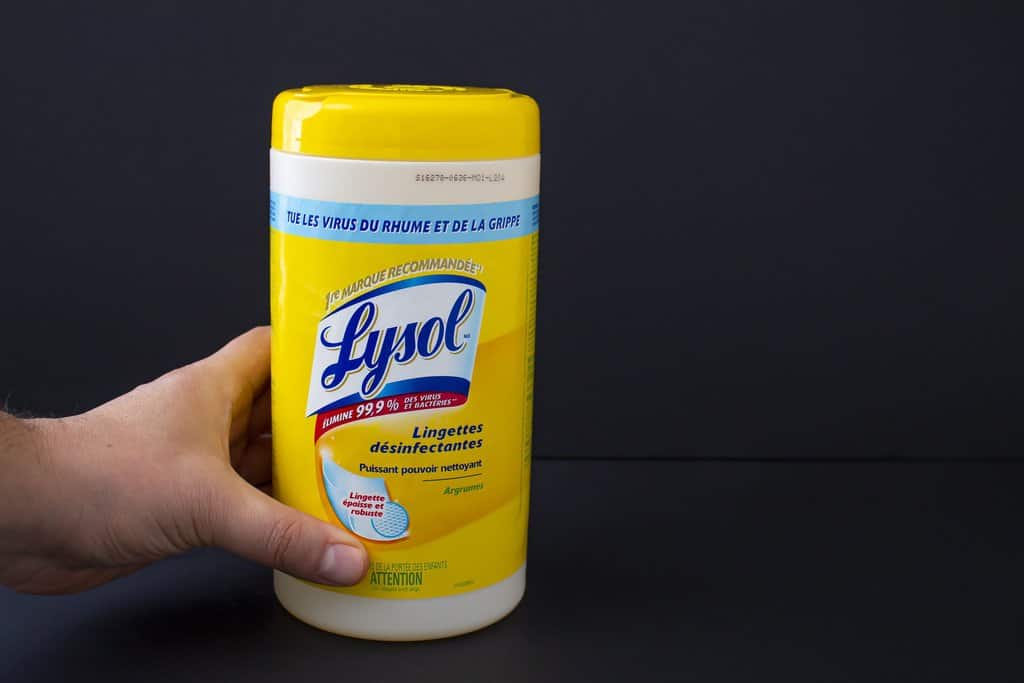Disinfectant wipes are usually quite harsh on the leather. In most cases, you really shouldn’t use disinfecting products on leather so haphazardly as these products are mostly used for hard, non-porous surfaces like kitchen countertops. In this article, we will discuss whether you are able to use Lysol wipes on leather and how to use them.
What are Lysol wipes?
Lysol wipes are disinfecting wipes by the popular cleaning and air freshener brand Lysol. These wipes are effective disinfecting products as they can kill bacteria and viruses, including COVID-19.

What do Lysol Wipes contain and what are they used for?
According to smartlabel’s active ingredient information page, Lysol wipes contain ethanol and alkyl dimethyl benzyl ammonium chloride which is effective cleaning agents. It also contains alkyl glucoside, which is a surfactant that helps remove smells, dirt, and stains.
Can you use Lysol wipes on real leather?
Because of the alcohols, and ammonium-benzene-based ingredients in the wipes. The alcohol on leather can dry it out. However, if your leather is coated with a synthetic coated layer, you may be able to use these wipes on real leather. However, if there is no coating and it makes direct contact with the leather, avoid these wipes. Use wipes specially formulated for leather.
Can you use Lysol wipes on faux leather?
Faux leather is much more chemically resistant than real leather. In some cases, you may even be able to use bleach as long as you exercise a lot of caution. Lysol wipes do not have ingredients that will damage or degrade the faux leather. However, you may want to make sure that you don’t leave any liquid from the wipes after using them.
Pros
Here are some of the pros of using Lysol disinfecting wipes on your faux leather goods:
Lysol wipes will kill bacteria on faux leather
These disinfecting wipes work really well when it comes to killing germs and bacteria on almost any surface including leather. However, you should not apply too much pressure when wiping down the surface as it can damage the dyes or finish of your faux leather item. That’s why it’s crucial for you to know if the leather is finished because otherwise, harsh chemicals might seep into the fibers.
They’re easy to use
Compared to other methods of cleaning and disinfecting leather which may include step-by-step processes, using Lysol wipes are pretty straight to the point. All you need to do is pull one out and start wiping the leather surface. It’s also a convenient cleaning product because you can carry it everywhere you go and use it anytime you need to.
Lysol wipes are cheaper
It’s true that disinfecting wipes like Lysol wipes are much cheaper compared to other leather cleaning products. You can buy one for around $5 (80 pieces) and be on your way. However, we’d like to remind you that cheaper doesn’t always mean good especially when it comes to leather maintenance.
Cons
Now that you know the benefits of Lysol wipes, it’s time to know why they’re not recommended for use on leather goods. Here are some of the risks you will face when using Lysol wipes.
They can’t deep clean
If you’re thinking of deep cleaning your leather item, you might as well go for leather cleaning products to get your money’s worth and ensure that you won’t be damaging the leather. Even if you wipe the surface of the leather properly using the Lysol wipes, it will still not completely get rid of the grimes and dirt stuck in the leather fibers.
- Non-toxic, Gentle Cleaner: Our proven, rejuvenating formula is a powerful, fragrance-free cleaner...
- Clean All Types of Leather: Quickly and gently removes dirt, oil, tough stains and grime from car...
- Safe for You, Safe for Leather: Made with non-toxic, high-quality ingredients that makes your...
Lysol wipes can leave a strong smell
Most disinfectant wipes pose a threat of leaving an unwanted odor on faux leather materials because of the components that make it fragrant. For some people, these smells can be too strong and can trigger allergic reactions.
Lysol wipes may cause staining
Since disinfecting wipes are damp, there is a possibility that they will leave water spots on your leather item especially if you leave excess moisture on the surface. This is especially bad if you don’t air dry it after wiping. If you continue using Lysol wipes to disinfect leather, eventually it will leave a noticeable stain mark on your leather goods.
Disinfecting wipes contain harsh chemicals
This is perhaps the most obvious reason why disinfecting wipes are not recommended when cleaning leather goods. The main ingredient for these types of wipes is most likely bleach and this active ingredient will definitely ruin a good leather item if it comes into contact with it.
Even on faux leather items which are made from plastic, the bleach can damage the protective layer which can cause dryness and eventually cracking or peeling. Alcohol-based wipes like Lysol have chemicals that can have adverse effects when used on leather.
Things to consider before using Lysol wipes on leather
While Lysol wipes are safe to use on faux leather, you may still want to be careful in case it will ruin the colors of your faux leather or coated leather item.
Make sure to test it in a discreet area and use it as you normally would. Leave it for a few minutes before coming back to check if it has affected the material in any negative way.
We are not liable for any damage that you may cause to your items, please exercise caution when using disinfecting products on any delicate items.
How to use Lysol wipes on faux leather
It is quite easy to use Lysol wipes on faux leather. You can also use it on coated leather as they are usually non-porous. If you want to clean your leather items with Lysol wipes, here’s how you can do so.
The materials on faux leather are usually quite chemically resistant as you won’t find any organic material on it. The fabric is usually polyester and the synthetic coating is usually polyurethane or vinyl. These materials can be wiped with disinfectant wipes quite safely.
These are perfect for disinfecting your leather car seats or leather sofa and you simply need to wipe the surface with light pressure. The Lysol wipes may leave behind a wet trail. To avoid any staining caused by prolonged exposure to the ingredients in the wipes, make sure to use tissues or a dry microfiber cloth to wipe off any remaining liquid.
Coated leather
Coated leather is usually non-porous and has a synthetic outer layer that can be made of the same type of coating that faux leather uses. If the surface is shiny or does not absorb any water, that’s one way to tell if the material is non-porous or not. Once you have confirmed that it will not absorb any liquid, you may proceed to use the wipes.
You may use the wipes the same way mentioned above. Always make sure to test it first, however.
Lysol Wipes Alternative
The Leather Repair Company Anti-Bacterial Spray is an excellent disinfecting product that is safe for leather. It is quite difficult to find a leather-safe cleaning product that is able to disinfect properly.
Most disinfecting products are usually not safe for leather, but the Leather Repair Company fills in that gap in the market.
This product may still be harsh even if it is safe for leather, so make sure to test it for any discoloration on your leather first. Testing in a discreet spot is a good practice whenever it involves any cleaning liquids for your leather items.
Conclusion
Lysol wipes are a great product for keeping your home safe from bacteria and viruses. However, it may not be suitable for delicate items like leather. We want you to keep your health safe, but also keep your leather goods safe as well.
Spending a lot of money on leather and ruining it in one wipe hurts, and we hope this article will help you make an informed decision on what you can use on your leather items.
FAQ
Can you use disinfectant wipes on leather?
You may use disinfectant wipes on leather, but there are far too many risks for us to recommend it. If you own a leather item made from real leather, we highly suggest you steer clear from disinfecting wipes and stick to products that are made for leather cleaning.
For faux leather items, you may use disinfecting wipes but with extreme caution as they can still damage the item even if it’s made out of plastic materials. We discussed in the section above the pros and cons of using disinfecting wipes on faux leather.
Will Clorox wipes discolor leather?
Yes, if the leather material is dyed, then Clorox wipes will cause discoloration. Most leather items in the market today are chrome-tanned and if it comes into contact with harsh chemicals like bleach or ammonium found in disinfecting wipes, they will discolor. As we mentioned before, the finishing used as a protective layer on faux leather items may also get damaged from harsh chemicals and will cause the dyes to move.
What liquid ruins leather?
When it comes to suede or nubuck which have fluffy textures, liquid can cause irreversible damage. We suggest you apply a water-repellant spray as soon as you get your hands on your new suede to protect it from any liquid damage in the future.
Almost any type of liquid when left too long on leather surfaces will ruin it. This applies to both faux and real leather items. Water and sweat are the most common liquid that causes damage to leather because many people often leave it and won’t wipe the surface immediately with a dry cloth.






